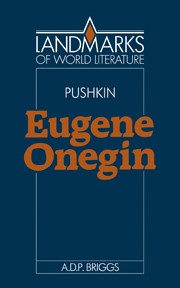Book contents
- Frontmatter
- Contents
- Preface
- Note on translations and references
- Chronology
- Chapter 1 The poetry of Eugene Onegin
- Chapter 2 Shades of unreality
- Chapter 3 The unreal reputations of Eugene Onegin and Tatyana Larina
- Chapter 4 Olga, Lensky and the duel
- Chapter 5 It is in verse, but is it a novel?
- Guide to English translations and further reading
Chapter 1 - The poetry of Eugene Onegin
Published online by Cambridge University Press: 05 November 2011
- Frontmatter
- Contents
- Preface
- Note on translations and references
- Chronology
- Chapter 1 The poetry of Eugene Onegin
- Chapter 2 Shades of unreality
- Chapter 3 The unreal reputations of Eugene Onegin and Tatyana Larina
- Chapter 4 Olga, Lensky and the duel
- Chapter 5 It is in verse, but is it a novel?
- Guide to English translations and further reading
Summary
Introduction
Alexander Pushkin's Eugene Onegin is one of the most distinctive and significant of all the landmarks of world literature. It stands in a proud position at the very head of modern Russian literature, first-born in the grand series of nineteenth-century realist novels for which that culture is so highly esteemed. After Pushkin came Lermontov, Gogol, Turgenev, Dostoyevsky, Tolstoy and all the rest; without him as forebear they could never have written as they did. Any educated Russian will tell you that Pushkin is the father of their literature, even the creator of the modern literary Russian language; he or she will probably also add that Eugene Onegin is his greatest work. It is also a work which people love, savour and return to; a classic that they want to keep on reading. A measure of the affection in which this story is held may be taken from its unusual claim to be probably the most intimately known of all literary landmarks except for the Bible and the Koran. It is too good not to learn by heart. Russians do this, either under coercion at school or as a labour of love, and never regret it. Your present author would not have approached this book without having lived intimately with Eugene Onegin for years that run into decades and without committing large tracts of it to memory. To state this is not to show off; it is to pay due tribute in advance to one of the world's finest books and to mark its uniqueness. How many other such landmarks can inspire, and perhaps require, such intimate familiarity?
- Type
- Chapter
- Information
- Alexander Pushkin: Eugene Onegin , pp. 1 - 27Publisher: Cambridge University PressPrint publication year: 1992
- 1
- Cited by

